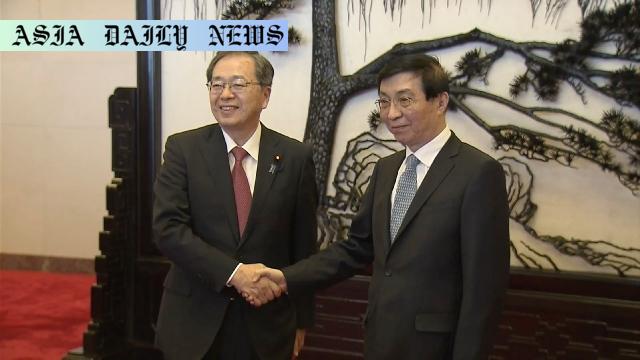Free Trade: Japanese politician Saito Tetsuo and Chinese leader Wang Huning emphasized dialogue, addressing seafood tariffs and military concerns.
- Japanese politician Saito Tetsuo met Chinese leader Wang Huning in Beijing to discuss free trade.
- Concerns about US-China tariffs and their impact on Japanese businesses were raised.
- Japan urged China to resume imports of Japanese marine products swiftly.
- The meeting highlighted China’s adherence to international trade rules.
- A shared understanding was established to foster dialogue on mutual concerns.

Strengthening Economic Cooperation Amid Global Challenges
On Wednesday, a pivotal meeting took place at the Great Hall of the People in Beijing, showcasing the efforts of Japan and China to strengthen their economic ties in an era marked by global trade tensions. Saito Tetsuo, leader of Japan’s Komeito party, met with Wang Huning, a prominent member of the Chinese Communist Party’s Politburo Standing Committee, to reaffirm both nations’ commitment to upholding the principles of free trade. This dialogue was particularly crucial given the impact of tariffs imposed by US President Donald Trump’s administration, which continue to affect global markets.
During the discussions, Saito expressed Japan’s concerns over the economic ripple effects stemming from the trade disputes between the United States and China. Japanese businesses, integral to the Asian economy, have felt the strains of these evolving dynamics. Recognizing China as an economic powerhouse, Saito emphasized China’s responsibility to play by widely accepted international regulations. Wang acknowledged the shared global interest in preserving a free trade framework and committed to enhancing China’s role in safeguarding economic stability.
Addressing Trade Barriers and New Opportunities
One pressing issue on Japan’s agenda was urging China to resume imports of Japanese marine products. This request comes amidst heightened economic uncertainties and Japan’s intent to bolster exports. Saito’s move underscores Tokyo’s proactive steps in mending trade ties with Beijing despite lingering tensions.
Wang’s response reflected a willingness to engage in meaningful dialogue, fostering optimism for a quicker resolution. While trade discussions dominated the agenda, the meeting also touched upon broader geopolitical concerns. Japan’s apprehensions regarding the Chinese military’s activities in the East China Sea and China’s detentions of Japanese nationals were highlighted. These complex issues, when combined with the broader economic discussions, painted a picture of interconnected challenges and opportunities, urging both sides to prioritize constructive engagement.
Commitment to Dialogue and Mutual Understanding
Beyond addressing immediate trade concerns, the meeting emphasized the importance of open communication channels between the two nations. Saito handed over a letter from Japanese Prime Minister Ishiba Shigeru to Chinese President Xi Jinping, reinforcing the commitment to fostering top-level exchanges. Wang assured the prompt delivery of this letter, symbolizing active cooperation at the highest level of governance.
Both parties recognized the value of discussing not just government-to-government relations but also fostering inter-party dialogue. Saito later noted that these discussions resulted in a shared understanding to take a candid and transparent approach, particularly on issues that resonate deeply with both nations’ public sentiments. This spirit of cooperation marked a significant step forward in addressing existing concerns and clearing pathways for future collaboration.
The Bigger Picture for Free Trade
This meeting carried broader implications far beyond the immediate issues at hand. In an increasingly interconnected world, free trade acts as the backbone of growth and stability for nations, particularly in regions with complex histories like Asia. The discussions between these senior leaders underscored the essential role Japan and China play, not just as regional economic drivers but as crucial players on the world stage.
In the face of rising protectionism and economic nationalism, reaffirming the principles of free trade is not just a diplomatic necessity but a global responsibility. By collaboratively addressing domestic and international challenges, both nations demonstrated a commitment to building a robust economic framework capable of benefiting their people and the international community.



Commentary
Balancing Economic Aspirations with Geopolitical Realities
The recent meeting between Japanese politician Saito Tetsuo and Chinese leader Wang Huning reveals the delicate balancing act nations must perform on the global stage. At its core, the dialogue highlighted the intertwined nature of economic priorities and geopolitical concerns. For Japan, ensuring economic stability amidst US-China trade tensions is vital, as these dynamics profoundly impact Japanese businesses. Simultaneously, broader discussions showcased Japan’s concerns about China’s growing military assertiveness in the East China Sea, indicating Tokyo’s need to address security issues alongside economic matters.
The Shared Value of Free Trade
Free trade emerged as the heart of the discussion—a principle that binds nations for mutual benefit despite political differences. Saito’s call for China to adhere to international trade standards and Wang’s acknowledgment of the shared interest in preserving trade frameworks underscore the importance of cooperation in an interconnected global economy. As protectionist sentiments grow worldwide, this reaffirmation of free trade sends a powerful message about prioritizing long-term economic health over short-term, insular gains.
Hopeful Signs of Further Collaboration
The meeting’s outcomes signify a positive step forward in Japan-China relations. By exchanging concerns openly and pledging to maintain a spirit of dialogue, both nations demonstrated their resolve to tackle complex issues collectively. Whether through addressing marine product exports or broader security concerns, this engagement reflects an understanding that stable bilateral relations will benefit not just their national interests but also the global community.
In conclusion, this meeting highlights that even amidst significant challenges, there is room for optimism and collaboration. The commitment to navigating nuanced issues through dialogue serves as a reminder that diplomacy and mutual understanding remain indispensable tools in fostering sustainable global progress.